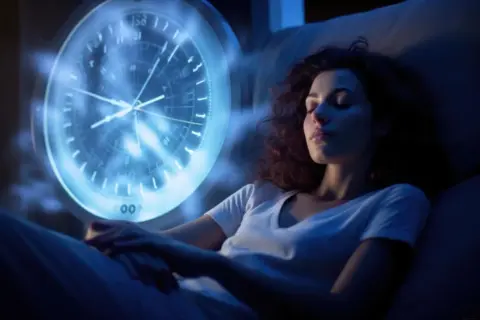 Working odd hours can feel like a superpower, on the good days. When the world is asleep, you’re out there getting things done. But when your sleep schedule turns into a disaster zone? That so-called “superpower” feels more like kryptonite.
Working odd hours can feel like a superpower, on the good days. When the world is asleep, you’re out there getting things done. But when your sleep schedule turns into a disaster zone? That so-called “superpower” feels more like kryptonite.
For shift workers, balancing work and rest is like trying to solve a puzzle with missing pieces. And that’s where melatonin comes in, it might just be the missing piece you didn’t know you needed.
We’ll go into the fine details on how melatonin works, why it’s a new development for shift workers, and how you can use it to finally get some quality sleep. Expect science-backed information, practical strategies, and dare we say a little hope.
The Shift Workers Sleep Struggle: Why Is It So Hard?
Let’s start with a reality check. Shift work isn’t just inconvenient, it’s actively working against you. Specifically, it’s at war with your circadian rhythm, your body’s internal clock that decides when you should be awake and when you should be asleep.
This clock runs on light and darkness. Sun goes down? Body starts winding down. Sun comes up? Brain says, “Wake up, time to go!”
But when you’re working overnight shifts, early mornings, or bouncing between different schedules, that rhythm gets thrown into total chaos. And the effects?
- Insomnia – You’re exhausted but can’t sleep when you actually need to.
- Fatigue – You wake up feeling like you barely slept (because, well…you did barely sleep).
- Brain fog – Concentration? Memory? Productivity? All running on fumes.
Long-term, poor sleep can mess with everything from your mood to your immune system to your heart health.
This is where this sleeping aid comes to the rescue. But before we get into how it helps, let’s clear up what it actually is.
What Is Melatonin, and Why Should You Care?
Melatonin is a hormone naturally produced by your pineal gland (tiny but mighty, sitting right in the brain). Think of it as your body’s built-in sleep switch.
| When It’s… | What Happens |
|---|---|
| Dark | Your body cranks up melatonin production, nudging you toward sleep. |
| Light | Melatonin levels drop, keeping you awake and alert. |
Here’s the problem: If you’re a shift worker trying to sleep during the day, your body doesn’t get the memo. Melatonin levels stay low, and sleep becomes a struggle.
That’s why supplementing with melatonin can be a big step forward. It helps you reset your internal clock and actually get the rest you need.
How Melatonin Helps Shift Workers
1. Adjusts Your Body Clock
Melatonin helps retrain your circadian rhythm to match your work hours. Think of it like a GPS for your sleep cycle, rerouting you from “bright daylight alert mode” to “deep sleep recovery mode.” If you’re bouncing between shifts, melatonin provides some much-needed stability in the chaos.
Thus, melatonin is a multifaceted candidate with immense therapeutic potential and is still considered an effective supplement on various therapies. This is primarily due to rectification of aberrant circadian rhythm by improvement of sleep quality associated with risk development of neurodegenerative, cognitive, cardiovascular and other metabolic disorders, thereby enhancing the quality of life (Significance of Melatonin in the Regulation of Circadian Rhythms and Disease Management | Molecular Neurobiology).
2. Improves Sleep Quality
Trying to sleep after a night shift can feel like an uphill battle, your brain refuses to cooperate, the neighbors are mowing their lawn, and your blackout curtains aren’t quite blackout enough.
Melatonin helps. It shortens the time it takes to fall asleep, keeps you asleep longer, and leaves you feeling more rested, even if the sun is doing its best to sabotage your plans.
3. Reduces Shift Work Sleep Disorder (SWSD) Symptoms
Shift Work Sleep Disorder (SWSD) is no joke. Insomnia? Check. Zombie-like exhaustion during your shift? Also check.
Studies show that melatonin can ease these symptoms, making it easier to function both at work and in your actual life. So instead of dragging yourself through another shift half-asleep, you might actually feel like a human again.
Exogenously administered melatonin is effective in shift worker health personnel that are suffering from sleep disorders, and given its low adverse effects and tolerability, it might be recommended (The Effects of the Exogenous Melatonin on Shift Work Sleep Disorder in Health Personnel: A Systematic Review – PMC).
The Right Way to Use Melatonin as a Shift Worker
Timing and dosage matter. Get it right, and you’ll set yourself up for better sleep. Get it wrong, and you might just end up groggy at the worst possible moment.
Start Small
Bigger isn’t always better. Start with a low dose, around 0.5 to 1 mg and adjust if needed. Higher doses don’t necessarily work better; they just increase your odds of feeling groggy the next day.
Take It at the Right Time
When should you take melatonin? It depends on your schedule:
| What’s Your Shift? | What You Should Do |
|---|---|
| Night | Take it 1–2 hours before your planned bedtime (e.g., 8 a.m. if you sleep during the day). |
| Rotating | Try to time it so it helps you transition smoothly between shifts. |
| Evening | You might not need melatonin at all, just tweak your exposure to light. |
Stay Consistent
 Your body loves routine. If you take melatonin, do it at the same time every day, even on your days off. Otherwise, you’re just confusing your internal clock all over again.
Your body loves routine. If you take melatonin, do it at the same time every day, even on your days off. Otherwise, you’re just confusing your internal clock all over again.
Common Misconceptions About Melatonin
“It’s a Sleeping Pill.”
Not exactly. Melatonin isn’t knocking you out like a prescription sedative, it’s more like a gentle nudge toward sleep. If you’re expecting instant lights-out, you’ll be disappointed.
“More Is Better.”
Nope. Higher doses don’t magically give you superior sleep. So what they can do? Leave you groggy, headachy, and regretting your choices.
“It Works Immediately.”
Some people feel the effects right away, but for most, it takes a few days to a week to regulate your sleep cycle. So don’t expect a one-night miracle, give it time.
Sleep Hacks That Work (Beyond Melatonin)
Melatonin gets all the love. But if you’re tossing and turning, relying on a single supplement isn’t the magic fix.
Want a real, restful sleep? Try these battle-tested strategies:
1. Control Your Light Exposure
Your body clock is watching so treat it right. Block out daylight during sleep hours, blackout curtains, sleep masks, whatever it takes. Flip the script when you’re awake. Get as much bright light exposure as possible to reset your circadian rhythm.
Sunlight = awake. Darkness = sleep. Simple, right?
2. Create a Sleep Sanctuary
Your bedroom isn’t just a room. It’s a sleep temple. You should keep it:
- Cool: Think 60-67°F
- Quiet: White noise machines are your best friend
- Distraction-free: Yes, that means ditching your phone)=
If your sleep space isn’t working for you, you’re working against yourself.
3. Stick to a Sleep Schedule
 Your brain loves routines so make sure that you go to bed and wake up at the same time every day. Yes, even on weekends. No, sleeping in ‘just this once’ won’t help.
Your brain loves routines so make sure that you go to bed and wake up at the same time every day. Yes, even on weekends. No, sleeping in ‘just this once’ won’t help.
Consistency trains your body to fall asleep faster and wake up feeling human.
4. Limit Stimulants
Caffeine, nicotine, and those late-night feasts. All fun but also all bad for sleep.
You should cut caffeine at least six hours before bed and avoid nicotine, it’s a sneaky stimulant. Skip the heavy meals close to bedtime (your digestive system will thank you).
Your body shouldn’t be working overtime when it’s supposed to be resting.
Good sleep isn’t a luxury, it’s a must.
Your body heals, your brain resets, and your mood levels out while you sleep. And if you work shifts? It’s even more needed.
Melatonin can help, but your habits matter more. Set yourself up for success, and you’ll wake up ready to take on anything.
Now go reclaim your rest. You deserve it.
Where to buy Melatonin
Here are the most reliable and trusted sites where you can purchase Melatonin (Sleepy Owl):
| PillHeal | ✅ Discounted prices ✅ Free shipping on orders over $200 |
Visit |
